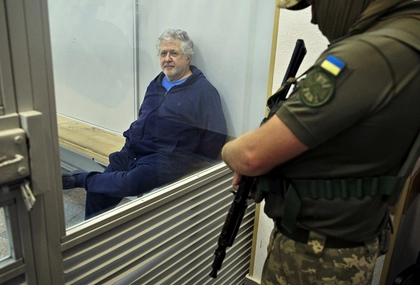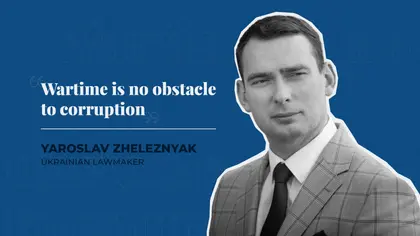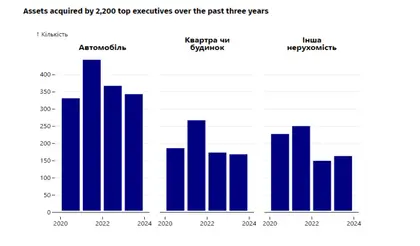A senior Ukrainian lawmaker has named what he believes are the three most corrupt government agencies which all contributed to huge losses in the country’s state budget in 2022.
Yaroslav Zheleznyak of the opposition Holos (Voice) faction in the Ukrainian parliament, is currently heading a commission whose remit is to investigate possible violations of Ukrainian legislation by officials. He claims that “billions are being stolen.”
- Access the newest war in ukraine update in the Kyiv Post's daily news articles published today.
- Check the most up-to-date Ukraine news reports from today.
JOIN US ON TELEGRAM
Follow our coverage of the war on the @Kyivpost_official.
Kyiv Post spoke with Zheleznyak and asked him to name the agencies he points to and explain why he believes they are responsible for such damage to the Ukrainian economy.
Customs Service – Still Problematic
According to Zheleznyak, the Ukrainian Customs Service, which collects tariffs on the flow of goods into and out of the country, is a prime example of “inefficiency and corruption.”
“Just 56.9 percent, 300 billion hryvnias [$8.2 billion] of the planned 528 billion hryvnias [$14.5 billion], were received by the budget in 2022,” he said.
The Customs Service has always had a reputation as one of the most corrupt agencies in Ukraine and since 2014 all attempts at reforming this organization have met with failure.
The war has heavily affected the work of the Customs Service due to the loss of transit, customs privileges, and export restrictions on customs revenues.

Kolomoisky Suspected of Paying to Have a Man Killed
However, devaluation of the hryvnia and soaring inflation have played a significant role in increasing the value of payments to be received by the Customs Service which should have offset the effects of the war.
Zheleznyak told Kyiv Post that the failure to collect revenues for the state budget by 44 percent was clear: “The main reason for such failure on the part of the Customs Service is very simple – they steal there.
“Billions are being stolen," he said.
As a comparison, he said the State Tax Administration managed to fulfill peacetime targets by almost 100 percent despite the loss of taxpayers and the wider economic consequences of the war.
In December, the Security Service of Ukraine (SBU) exposed an embezzlement scheme at the Odesa branch of the Customs Service involving Ukrainian grain export funds.
More than 10 high-ranking officials are allegedly involved in the scheme, including the deputy head of one of the departments of the State Migration Service and management at Odesa Customs.
Officials discovered a large-scale tax evasion mechanism used in the export of Ukrainian grain resulting in the loss of hundreds of millions of hryvnias that should have entered the state budget.
The Customs Service did not respond to a request for comment from Kyiv Post.
The Economic Security Bureau
The Economic Security Bureau (ESB) officially began operations back in November 2021 and was expected to become a counterpart to the National Anti-Corruption Bureau in Ukraine, but this goal has still to be achieved.
According to official statistics, in the first six months of 2022, the ESB investigated 323 proceedings. However, just 62 were completed and only four indictments were actually sent to court.
According to Zheleznyak, the ESB spent 211 million hryvnias [$5.8 million] from the state budget in the first 11 months of 2022, but the state budget failed to receive a single hryvnia from its operations.
"Over the course of 11 months, the ESB submitted only seven cases to the courts. The sum of compensated damages from criminal proceedings is zero," Zheleznyak wrote on his Telegram channel.
Such inefficiency, he claims, can only be explained by the actions of employees of the organization in covering up irregularities and involvement in corrupt schemes.
"There is so much fraud, and we are losing 10-20 billion hryvnias [$250-500 million] every month as a result of illegal activities – in tobacco, gambling, alcohol trafficking, tax evasion, etc.," Zheleznyak said.
Last month the SBU accused a detective from the ESB in Zakarpattia Region of bribery.
He is said to have received around $6,000 in exchange for protecting the illegal trading of electronic cigarettes from local entrepreneur.
The ESB did not respond to a request for comment from Kyiv Post.
Assets confiscator ARMA
The Asset Recovery and Management Agency (ARMA) is a special governmental body that traces and seizes assets of those involved in criminal proceedings.
Zheleznyak said ARMA was the third agency on his list due to the infective selling of seized Russian assets.
"The most glaring example is the ammonia case," Zheleznyak explained.
Back in November 2022, ARMA sold 42,000 tons of Russian ammonia, seized at the start of Russia’s full-scale invasion last year.
ARMA’s management decided to split the 42,000 tons into smaller lots and sell them via the Prydniprovye-2021 commodity exchange,
A total of three auctions were held but the selling price per ton of ammonia was, on average, $300 less than the price via the Prozorro online auction. On Sep. 16, the state-owned enterprise Ukrkhimtransamiak sold the same chemical at a price of $1,312 per ton.
Zheleznyak claims the sale was a prime example of Ukraine's inefficient management when selling confiscated Russian assets.
When Kyiv Post asked ARMA to respond to this accusation, its head, Oleksiy Tamozhansky, said the difference in prices was due to the fact that goods sold by ARMA do not include the 20 percent VAT that is paid by the buyer.
He also said the price does not reflect the cost of storage at the Odesa Port Plant, which is $250, so therefore the price on the Prozorro is not comparable.
The quick sale of ammonia was a priority for the government to avoid the risks associated with the war. In general, the market of confiscated goods is problematic for buyer, Tamozhansky admitted. The buyer has to clear the goods and obtain additional permits, which may incur additional costs.
Clearly, as Zheleznyak indicates, from the point of view of proper accountability, there is plenty to check, probe, and report on.
You can also highlight the text and press Ctrl + Enter






